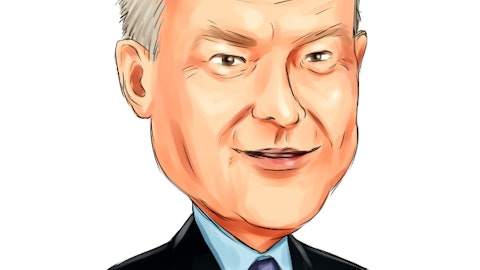Jordan Kaplan: So I think there’s only two leases and one of them is a whole building, which is the 3400 Riverside Drive. And that building is about 450,000 and the lease expires in the second half of ’24. And as I know — I mean, everybody thinks just to know what they’re going to do, I’m anxious to know what they’re going to do. I mean, I’m not — I’ll tell you I’m not optimistic considering what’s going on with the economy today when you talk about the economy two years from now, and I don’t know what they will do or will want to do, they don’t have any more options. But of course, I don’t think they even know what they want to do at this point. I mean the real estate group that we made the original deals with, which I think did have an expectation of keeping the building, all of them are gone.
I mean — so we don’t even have a good way to get us — I mean, we’re reading the same stuff you’re reading, they’re cutting expenses, and I know that, but I don’t know where they’ll be in two years.
Michael Griffin: Then I wanted to turn to your thoughts just on capital allocation for ’23. Obviously, with the announced dividend, reduction in share reauthorization program at the end of last quarter. I mean could we potentially see you being more acquisitive if the right opportunities came about, be they for either office or multifamily or do you think it’s more pragmatic to stick to potential share buybacks?
Jordan Kaplan: Well, just a general answer because share buybacks, multifamily as points are all being acquisitive, I guess, acquiring. And I think it’s a good time to acquire. I think we’re well organized to acquire. Certainly, the dividend cut gave us even more firepower to do that. We have unleveraged buildings, cash. I mean we have a whole list of things. And my goal is not to allow the opportunities in any particular recession, particularly one that’s this extreme to pass it out us taking advantage of it, and I want to do that.
Operator: The next question is from Alexander Goldfarb with Piper Sandler.
Alexander Goldfarb: So two questions. First, just going back to the Barrington fire, the project. Jordan, you and I have discussed this on the last call, but just — so I understand how it impacts FFO. Is any of that project in the guidance that you laid out for this year, or just based on timing, it’s probably not something that would really impact FFO until next year?
Jordan Kaplan: No, there’s some in the FFO guidance for this year. But it’s hard depending on the pace at which we work things out with the city and with insurance, it’s hard to know how much will impact this year, and I suspect the largest impact will be next year. Even if everyone says like open, do it everyone, everyone do whatever you want, you have a lot of groundwork to do in terms of installing core equipment that may not impact units as much before we can go in and start impacting the buildings.
Alexander Goldfarb: So it’s in guidance, but the bulk of the impact is really a 2024 event, that’s the way to understand it?
Jordan Kaplan: Yes. And even that, yes, that should be true. But this all relies on like what kind of deals we make also with insurance and the pace at which we move people out, and those are like giant numbers, right? I mean we make a deal of insurance vis-a-vis the revenue, that’s one thing, that maybe you guys have never seen an impact and then, of course, the speed at which we move people outside. So if I’m guessing now, yes, ’24.





